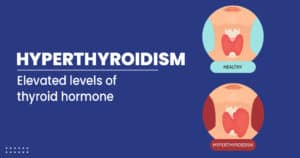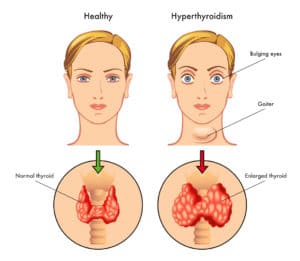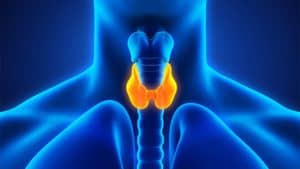Thyroid disorders affect millions of people worldwide and can cause a wide range of symptoms, including fatigue, weight gain, and anxiety. The thyroid gland plays a crucial role in regulating metabolism, energy levels, and body temperature, and when it malfunctions, it can lead to a variety of health problems. Proper thyroid diagnosis and thyroid treatment are essential to managing thyroid disorders and improving quality of life. In this article, we will explore the different types of thyroid disorders, their symptoms, and the various diagnostic and thyroid treatment options available to those affected by them.
How is Thyroid Diagnosed?
The thyroid diagnosis typically involves a combination of medical history, physical examination, and laboratory tests. The first step in the diagnostic process is usually a discussion with a healthcare provider, who will ask about any Thyroid Symptoms the patient is experiencing, as well as any family history of thyroid problems.
During a physical exam, the healthcare provider may palpate the neck to check for any lumps or enlargement of the thyroid gland. They may also check for signs of hyperthyroidism, such as rapid heart rate or tremors, or hypothyroidism, such as dry skin and hair loss.
Blood tests are the most common laboratory tests used to diagnose thyroid disorders. The tests typically measure the levels of thyroid-stimulating hormone (TSH), thyroxine (T4), and triiodothyronine (T3) in the blood. Abnormal levels of these hormones can indicate an overactive or underactive thyroid gland.
In some cases, imaging tests such as ultrasounds, CT scans, or MRIs may be ordered to get a more detailed look at the thyroid gland and to check for any nodules or other abnormalities.
In addition to these diagnostic tests, a biopsy may also be performed if a nodule or lump is found on the thyroid gland. During a biopsy, a small sample of tissue is removed and examined for signs of cancer or other conditions.
Overall, the thyroid diagnosis requires a thorough evaluation by a healthcare provider and may involve a combination of physical examination, laboratory tests, and imaging studies.
Treatment of Thyroid
The thyroid treatment depends on the specific type and severity of the condition. The most common thyroid disorders are hypothyroidism and hyperthyroidism, which are treated differently.
Hypothyroidism occurs when the thyroid gland is not producing enough thyroid hormones. It is typically treated with hormone replacement therapy, which involves taking synthetic thyroid hormones in the form of a pill. The most commonly prescribed medication for hypothyroidism is levothyroxine. The dosage is adjusted based on blood tests to ensure the proper levels of thyroid hormones are maintained.
Hyperthyroidism occurs when the thyroid gland is producing too much thyroid hormone. The thyroid treatment includes medications, radioactive iodine therapy, and surgery. Medications such as beta-blockers can help control the symptoms of hyperthyroidism, but they do not cure the condition(thyroid cure). Radioactive iodine therapy involves taking a dose of radioactive iodine, which is absorbed by the thyroid gland and destroys some of the thyroid cells, reducing hormone production. Surgery may be recommended in some cases if medication or radioactive iodine therapy is not effective.
Thyroid nodules or goiters, which are non-cancerous growths on the thyroid gland, may not require thyroid treatment unless they are causing symptoms or are suspicious of cancer. If treatment is necessary, options include observation, medication, or surgery.
Thyroid cancer is treated(thyroid cure) with surgery to remove the thyroid gland and sometimes radiation therapy or radioactive iodine therapy.
In summary, thyroid treatment depends on the specific condition and its severity. Treatment options(thyroid cure) include hormone replacement therapy, medications, radioactive iodine therapy, surgery, and radiation therapy. A healthcare provider can determine the best course of thyroid treatment based on the individual’s condition and medical history.
How to cure Thyroid?
There is currently no known cure for thyroid disorders(thyroid cure), but they can be effectively managed with appropriate thyroid treatment. The goal of thyroid treatment is to restore normal thyroid hormone levels and alleviate symptoms.
Hypothyroidism, which occurs when the thyroid gland is not producing enough thyroid hormones, is typically treated with hormone replacement therapy. The most common medication used is levothyroxine, which is a synthetic form of the thyroid hormone T4. The medication is taken orally, and the dosage is adjusted based on regular blood tests to ensure that the thyroid hormone levels are within the normal range.
Hyperthyroidism, which occurs when the thyroid gland produces too much thyroid hormone, can be treated with medication, radioactive iodine therapy, or surgery. Medications, such as beta-blockers, can be used to manage symptoms, but they do not cure the condition(thyroid cure). Radioactive iodine therapy involves taking a dose of radioactive iodine, which is absorbed by the thyroid gland and destroys some of the thyroid cells, reducing hormone production. Surgery may be recommended in some cases if medication or radioactive iodine therapy is not effective.
Thyroid nodules or goiters, which are non-cancerous growths on the thyroid gland, may not require thyroid treatment unless they are causing symptoms or are suspicious of cancer. If thyroid treatment is necessary, options include observation, medication, or surgery.
Thyroid cancer is typically treated with surgery to remove the thyroid gland, and sometimes radiation therapy or radioactive iodine therapy.
In summary, while there is currently no cure for thyroid disorders(thyroid cure), appropriate thyroid treatment can effectively manage the condition and restore normal thyroid hormone levels, thus alleviating symptoms. Thyroid treatment options vary depending on the specific condition and severity of the condition, and a healthcare provider can determine the best course of thyroid treatment for each individual.
Home Remedies & Lifestyle Tips to treat Thyroid
- Take medication as prescribed by your healthcare provider.
- Maintain a healthy and balanced Thyroid Diet Plan, rich in nutrients such as iodine, selenium, and zinc.
- Avoid foods that interfere with thyroid function, such as soy, gluten, and processed foods.
- Stay hydrated and drink plenty of water.
- Exercise regularly to maintain a healthy weight and reduce stress.
- Get enough sleep and practice stress-reduction techniques such as meditation and deep breathing.
- Monitor your thyroid hormone levels regularly with blood tests and adjust medication as necessary.
- Avoid smoking and limit alcohol consumption.
- Be aware of any changes in symptoms and report them to your healthcare provider promptly.
- Consult with your healthcare provider before taking any new supplements or making significant changes to your diet or exercise routine.
When should I see a Doctor for Thyroid?
You should consider seeing a doctor for thyroid if you experience any of the following symptoms:
- Fatigue and weakness
- Weight gain or weight loss
- Difficulty losing weight
- Sensitivity to cold or heat
- Constipation or diarrhea
- Changes in menstrual periods
- Muscle or joint pain
- Brittle hair or nails
- Dry skin or hair
- Swelling in the neck area
- Changes in heart rate or rhythm
- Anxiety or irritability
- Difficulty sleeping
These symptoms could indicate an issue with your thyroid gland, and it’s essential to get them evaluated by a healthcare professional. If you have a family history of thyroid disease or have previously been diagnosed with a thyroid condition, you may need to be monitored regularly by a healthcare provider. Get more understanding by going through our Thyroid Blogs.
It’s always best to consult with a healthcare provider if you have any concerns about your thyroid health, even if you are not experiencing any symptoms. A healthcare provider can perform a physical exam, order diagnostic tests such as blood tests, and determine if further evaluation or treatment is necessary.
The Bottom Line
The thyroid is a small gland in the neck that plays a vital role in regulating metabolism and other bodily functions. Thyroid disorders can cause a range of symptoms and health problems, including weight changes, fatigue, and changes in heart rate.
Diagnosing a thyroid disorder involves a physical exam, blood tests, and imaging studies, depending on the suspected condition. Treatment options vary depending on the specific condition and severity of the condition and can include hormone replacement therapy, medications, radioactive iodine therapy, surgery, and radiation therapy.
There is currently no known cure for thyroid disorders(thyroid cure), but appropriate treatment can effectively manage the condition and restore normal thyroid hormone levels, thus alleviating symptoms. Tips to manage thyroid disorders include taking medication as prescribed, maintaining a healthy diet and lifestyle, exercising regularly, monitoring hormone levels regularly, and reporting any changes in symptoms to a healthcare provider promptly.
If you experience any symptoms of thyroid disorders or have concerns about your thyroid health, it’s essential to consult with a healthcare provider for evaluation and appropriate management and thyroid cure.
FAQs
How can I cure Thyroid Naturally?
There is currently no known cure for thyroid disorders(thyroid cure/how to cure thyroid), and it’s essential to seek appropriate medical treatment for managing the condition. While there is no natural cure for thyroid disorders, some natural home remedies for thyroid may help support thyroid function and alleviate symptoms, but it’s essential to consult with a healthcare provider before trying any natural remedies, especially if you are already on thyroid medication.
Here are some natural home remedies for thyroid that may help support thyroid function:
- Eat a healthy and balanced diet rich in nutrients such as iodine, selenium, and zinc.
- Avoid foods that interfere with thyroid function, such as soy, gluten, and processed foods.
- Incorporate healthy and delicious Thyroid Recipes.
- Stay hydrated and drink plenty of water.
- Exercise regularly to maintain a healthy weight and reduce stress.
- Get enough sleep and practice stress-reduction techniques such as meditation and deep breathing.
- Consider supplementing with vitamin D, omega-3 fatty acids, and probiotics, which have been shown to support thyroid health.
- Some herbs such as ashwagandha, guggul, and bladderwrack are thought to have properties that may support thyroid function, but it’s essential to consult with a healthcare provider before using these herbs, especially if you are already on thyroid medication.
Remember, natural home remedies for thyroid may help support thyroid function, but they are not a substitute for appropriate medical treatment or home remedies for thyroid(how to cure thyroid). If you have a thyroid disorder, it’s essential to work with a healthcare provider to manage your condition effectively.
What is the Best Treatment for Thyroid?
The best treatment for thyroid(home remedies for thyroid/how to cure thyroid) depends on the specific type of thyroid disorder and the severity of the condition. The two most common thyroid disorders are hypothyroidism (an underactive thyroid) and hyperthyroidism (an overactive thyroid).
For hypothyroidism, the best home remedies for thyroid is typically hormone replacement therapy, which involves taking synthetic thyroid hormone (levothyroxine) to restore normal thyroid hormone levels. This medication is usually taken daily and requires regular monitoring of thyroid hormone levels to adjust the dosage as necessary.
For hyperthyroidism, home remedies for thyroid options may include medications to block the production of thyroid hormone, radioactive iodine therapy to destroy the overactive thyroid cells, or surgery to remove part or all of the thyroid gland.
In some cases, a combination of home remedies for thyroid may be necessary to effectively manage the condition. For example, a person with Graves’ disease (an autoimmune disorder that causes hyperthyroidism) may need to take medication to block thyroid hormone production and undergo radioactive iodine therapy or surgery to remove part of the thyroid gland.
It’s essential to work with a healthcare provider to determine the best home remedies for thyroid for your specific condition, as well as to regularly monitor your thyroid hormone levels and adjust treatment as necessary. With appropriate treatment and thyroid diagnosis, most people with thyroid disorders can effectively manage their condition and live healthy and active life.
Can Thyroid be cured completely?
There is currently no known cure for thyroid disorders(thyroid cure), but with appropriate treatment and thyroid diagnosis, most people with thyroid disorders can effectively manage their condition and live a healthy and active life.
For hypothyroidism, hormone replacement therapy with synthetic thyroid hormone (levothyroxine) can effectively restore normal thyroid hormone levels and alleviate symptoms. However, this treatment is usually required for life, and stopping the medication can cause symptoms to return.
For hyperthyroidism, treatment options such as medications, radioactive iodine therapy, or surgery can effectively manage the condition and restore normal thyroid function. However, some people may still experience symptoms or require ongoing treatment to manage their condition effectively.
It’s essential to work with a healthcare provider to determine the best treatment for your specific condition and regularly monitors your thyroid hormone levels to ensure that treatment is effective. While thyroid disorders cannot be cured completely(thyroid cure/how to cure thyroid), with appropriate treatment, most people can effectively manage their condition and maintain good overall health.
Can Thyroid be cured by Exercise?
While exercise is beneficial for overall health and can help alleviate some symptoms of thyroid disorders, exercise alone cannot cure thyroid disorders(thyroid cure/how to cure thyroid).
However, regular exercise can help maintain a healthy weight, improve cardiovascular health, reduce stress, and improve overall energy levels, which can all contribute to managing thyroid disorder symptoms.
Additionally, some studies suggest that regular exercise may help improve thyroid function in people with hypothyroidism by increasing the production of thyroid-stimulating hormone (TSH) and thyroid hormone uptake in the body. However, the effect of exercise on thyroid function is not fully understood, and it’s essential to work with a healthcare provider to determine the best treatment for your specific condition.
In summary, exercise can be a helpful addition to a comprehensive thyroid treatment plan for managing thyroid disorders, but it is not a cure(thyroid cure/how to cure thyroid) on its own. It’s essential to work with a healthcare provider to determine the best treatment plan for your specific condition, which may include medication, lifestyle changes, and regular monitoring of thyroid hormone levels.









